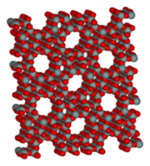Every week, it seems, I’m finding some new piece of brilliance from the chemistry department at Rice University, my alma mater.
This week is no exception.
Michael Deem (right) and his crew at the biochemistry department are using distributed computing technology to build an enormous database of zeolite designs.
Zeolites are porous minerals with hundreds of industrial uses. They’re used as catalysts in everything from gasoline to detergent to aquarium filters.
There are about 50 naturally-occurring zeolites, and over the years scientists have created another 180.
Zeem’s database of zeolite designs has…3.4 million. And it’s growing.
Zeem and company created the database by harnessing the Tergrid,
a collection of networked PCs at 8 major research institutions.
Deem
wound up getting access to 4,300 at Purdue (go Boilermakers). Just as
in the famous Seti@Home project, these PCs are only used by Rice when
they’re not doing anything else. They’re automatically given small
tasks and report back.
What this means is all those designs are now available for testing
and (possibly) construction. Which means more efficient production of
just about everything.
Hey, our chemists can beat up your chemists. <g>












